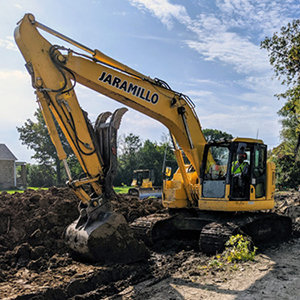Comprehensive Excavation Approaches: Understanding the Principles for Success
The mindful preparation, precise execution, and careful focus to information called for in excavation tasks require a thorough technique that incorporates different basic elements. The real mastery exists not simply in understanding these fundamentals yet in perfectly incorporating them to browse the intricacies of excavation tasks with finesse.
Recognizing Excavation Project Preparation

Effective excavation jobs are improved the structure of meticulous and complete preparation. The first phase of any excavation task is the planning stage, where important choices are made that can significantly impact the outcome of the job. Throughout this stage, it is necessary to gather all pertinent info about the site, consisting of topographical studies, soil structure, and any kind of prospective dangers that may exist. Understanding the task timeline, scope, and budget restrictions is critical for creating an extensive excavation plan that ensures the task's success.
One key element of excavation job preparation is the growth of a detailed timeline that details the series of landmarks, activities, and target dates. This timeline works as a roadmap for the project group, permitting them to track development and make needed adjustments to make certain the job remains on routine. Additionally, a well-defined budget that represents all expenditures, consisting of tools service, labor prices, and materials, is vital for preventing price overruns and delays. By meticulously considering all these factors during the preparation phase, excavation jobs can be carried out efficiently and successfully, resulting in effective end results.
Dirt Analysis and Site Examination
Conducting extensive dirt analysis and site assessment is a critical action in the prep work stage of any excavation project. Soil evaluation entails determining the structure, structure, and properties of the soil at the excavation site. This info is vital for recognizing the soil's bearing capacity, wetness material, and capacity for disintegration, which are crucial consider establishing the excavation methods and devices required for the project.
Site assessment surpasses soil analysis and includes a wider evaluation of the total website problems. This examination consists of determining any type of prospective dangers, such as below ground energies, environmental issues, or unsteady terrain, that could impact the excavation process. By thoroughly evaluating the website, task supervisors can create efficient excavation methods that prioritize safety, efficiency, and environmental management.
Making use of innovative innovations like ground-penetrating radar, soil sampling, and drone studies can improve the accuracy and efficiency of dirt evaluation and site evaluation. Spending time and sources in these preliminary actions can inevitably save time and prevent pricey hold-ups or problems during the excavation procedure.
Tools Selection and Utilization
Reliable excavation tasks depend heavily on critical devices selection and use to make sure optimal efficiency and efficiency. Selecting the appropriate devices for the job is crucial in taking full advantage of efficiency and minimizing downtime. Aspects such as the sort of soil, deepness of excavation, and job scope play a significant function in identifying the most appropriate equipment for the job handy.

In enhancement to picking the ideal tools, correct application is vital to task success. Operators has to be educated to take care of the tools securely and successfully - lancaster excavation. Regular maintenance checks and prompt repairs aid stop failures and make sure constant performance throughout the job
Precaution and Regulations Conformity
In the world of excavation jobs, prioritizing precaution and conformity with policies is critical to have a peek here ensuring a secure and legally audio operational atmosphere. Security actions incorporate a variety of practices, including carrying out detailed site evaluations, executing correct signage and barriers, and supplying sufficient safety and security training for all workers involved in the excavation procedure. Adherence to policies, such as OSHA needs in the United States, ensures that the excavation job meets the essential requirements to shield workers, spectators, and the surrounding atmosphere.
Tracking Development and Adjusting Techniques
How can project supervisors successfully track the development of excavation projects and adjust their strategies as necessary to maximize results? Monitoring progression is crucial for making sure that excavation projects remain on track and satisfy deadlines. Task supervisors can utilize numerous tools and techniques to track progression, such as daily report card, regular website inspections, and progressed monitoring modern technologies like drones and GPS tracking systems. By continually monitoring the job's advancement, supervisors can identify any type of potential delays or concerns at an early stage and take aggressive steps to resolve them.

Verdict
Finally, mastering the basics of click for more thorough excavation methods is important for the success of any kind of job. By understanding project preparation, examining dirt and website problems, selecting ideal equipment, following click to read safety guidelines, and monitoring development, job managers can make certain a effective and smooth excavation procedure. Implementing these strategies will certainly result in effective outcomes and decrease prospective threats or obstacles throughout the excavation job.
The preliminary stage of any excavation project is the preparation stage, where essential decisions are made that can considerably influence the result of the project. Comprehending the task timeline, extent, and spending plan restraints is important for developing a thorough excavation plan that guarantees the job's success.
How can forecast managers effectively track the improvement of excavation jobs and adjust their methods as necessary to enhance results? By closely keeping track of progression and being willing to adjust approaches, project supervisors can enhance the total success of excavation projects.
By understanding job preparation, evaluating soil and site problems, selecting ideal equipment, abiding with security policies, and monitoring progress, job managers can ensure a smooth and reliable excavation process.